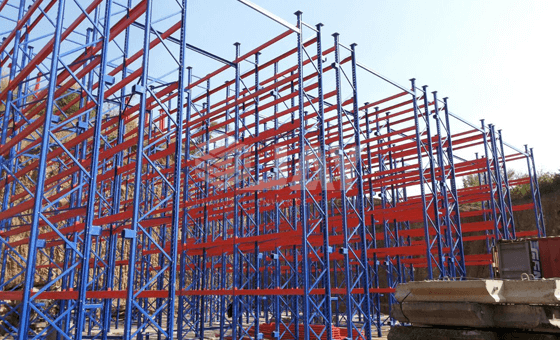How Is A Rack-Supported Warehouse Different From A Traditional Warehouse?

Warehousing and storage are integral parts of the supply chain of a business. As technology advances, warehouse structures have more options – from traditional designs to more modern rack-supported warehouses. What exactly is a rack-supported warehouse? How does it differ from a conventional warehouse?
Learn more about how the racking system in a rack-supported warehouse differs from a traditional one.
Rack-Supported Warehouse vs. Traditional Warehouse
There are several ways in which a rack-supported warehouse differs from a traditional warehouse. The most obvious difference is in the name.
Racks are integral to the support structure of a rack-supported warehouse. Racks are generally taller in a rack-supported warehouse allowing for more storage capacity in a smaller footprint. The increased height also allows for automated storage and retrieval systems (AS/RS), further improving efficiency and productivity.
Another key difference between rack-supported and traditional warehouses is the construction of the two facilities. Traditional warehouses typically use concrete block walls with metal roofing. Rack-supported warehouses use steel frame construction with metal panels or sheets for the walls and the roof.
The different construction method has several advantages for rack-supported warehouses, including improved strength and durability, greater flexibility for expansion or reconfiguration, and better protection against fire and severe weather events.
Rack-supported warehouses support the weight of the racks, while traditional warehouses are not. Rack-supported warehouses typically have double deep racking systems narrower than conventional ones, making them more efficient for storing and retrieving goods.
The Benefits of a Rack-Supported Warehouse
There are many benefits of using a rack-supported warehouse over a traditional warehouse. Some of them are:
Increased Storage Capacity
By utilizing a double deep racking system, you can maximize the height of your warehouse, allowing you to store more products in the same amount of space. It can be extremely beneficial if you have limited space available for your warehouse.
Increased Efficiency
Since racks store products, they are easier to access and retrieve than those stored on the floor. The result is a faster turnaround time and improved organization within the warehouse. Racks offer better product support as they help reduce damage during storage and retrieval. The benefits offered by this type of warehouse can be extremely valuable for businesses of all sizes.
Why Would Anyone Opt For Rack Supported Building?
There are several reasons why somebody would opt for rack supported building. Below are some of them:
- Optimized space
- Lesser footprints
- Reduced investment
- Resistance to extreme weather
- Return on investment in lesser time
- Good for cold storage
Is a Rack-Supported Warehouse Right for Your Business?
A rack-supported warehouse is a storage facility where the racks and shelves get support from a structure independent of the warehouse walls. It allows for more flexibility when it comes to layout and design and can also provide better support for heavier loads.
To understand if a rack-supported warehouse is right for your business. You need to determine if you have the space for this facility. You need to assess your needs in terms of storage capacity and decide if a rack-supported warehouse can meet those needs. Consider the cost of implementing and maintaining this facility.
If you have the space and your needs warrant it, a rack-supported warehouse can be a great solution for your business. It offers more flexibility than a traditional warehouse and can provide better support for heavy loads.
Rack-supported warehouses offer several benefits over traditional warehousing structures. Rack-supported warehouses are more efficient and cost-effective and provide improved employee safety conditions. Rack-supported warehouses are easier to expand as your business grows. For companies looking to maximize the efficiency of their warehouse operations and reduce costs, the advantages offered by rack-supported constructions make them an extremely attractive option worth considering.